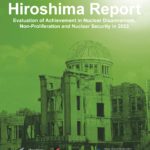Hiroshima Report 2018(6) DE-ALERTING OR MEASURES FOR MAXIMIZING DECISION TIME TO AUTHORIZE THE USE OF NUCLEAR WEAPONS
In 2017, there were no significant changes in nucleararmed states’ policies on alert and/or operational status of their respective nuclear forces.134 Russian and U.S. strategic ballistic missiles have been on high alert status,135 either launch on warning (LOW) or launch under attack (LUA). Forty U.K. nuclear warheads and 80 French ones are also kept on alert under their continuous SSBN patrols, albeit at lower readiness levels than those of the two nuclear superpowers.136 It is assumed that China’s nuclear forces are not on a hair-trigger alert posture because it keeps nuclear warheads de-mated from delivery vehicles.137 There is little definitive information regarding the alert status of other nuclear-armed states’ nuclear forces. In February 2014, Pakistan stated that it “would not delegate advance authority over nuclear arms to unit commanders, even in the event of crisis with India, [… and] all weapons are under the central control of the National Command Authority, which is headed by the prime minister.”138 It is widely considered that India’s nuclear forces are not on a high alert status.
A number of NNWS have urged the NWS to alter their alert posture. Among them, Chile, Malaysia, Nigeria, New Zealand and Switzerland, as the “De-alerting Group,” proactively proposed to reduce alert levels. At the 2017 NPT PrepCom, the Group urged the NWS to urgently implement “previously agreed commitments on de-alerting [sic] and take steps to rapidly reduce operational readiness—unilaterally, bilaterally or otherwise.”139
Proponents of de-alerting have often argued that such measures are useful to prevent accidental use of nuclear weapons.140 On the other hand, NWS emphasize that they have taken adequate measures for preventing accidental use, and express confidence regarding the safety and effective control of their nuclear arsenals.141 Besides, India and Pakistan extended their bilateral Agreement on Reducing the Risk of Accidents Relating to Nuclear Weapons in February 2017. Pakistan, which values SRBM forces for deterrence vis-à-vis India, emphasizes that its nuclear weapons and fissile material are unlikely to fall under the control of any extremist element since their nuclear arsenals are under robust, safe and complete civilian command-and-control system through the Nuclear Command Authority (NCA).142
In November 2017, the U.S. Senate Foreign Relations Committee held a hearing on the matter of presidential authority to order the use of nuclear weapons. It was confirmed that the U.S. President has the authority to defend the country in accordance with the U.S. Constitution when the United States suffers actual or imminent nuclear attacks. Interestingly, former Commander of the U.S. Strategic Command Robert Kehler testified that “the United States military doesn’t blindly follow orders. A presidential order to employ U.S. nuclear weapons must be legal… The basic legal principles of military necessity, distinction, and proportionality apply to nuclear weapons just as they do to every other weapon.”143 In addition, Commander of the U.S. Strategic Command John E. Hyten stated separately that he would resist any “illegal” presidential order to launch a strike and present alternatives.144
[134] See also the Hiroshima Report 2017.
[135] Hans M. Kristensen, “Reducing Alert Rates of Nuclear Weapons,” Presentation to NPT PrepCom Side Event, Geneva, April 24, 2013; Hans M. Kristensen and Matthew McKinzie, “Reducing Alert Rates of Nuclear Weapons,” United Nations Institute for Disarmament Research, 2012.
[136] See Kristensen, “Reducing Alert Rates of Nuclear Weapons”; Kristensen and McKinzie, “Reducing Alert Rates of Nuclear Weapons.”
[137] On the other hand, it has also been pointed out that China may be going to take a higher alert posture along with deployment of new SSBNs and MIRVed ICBMs.
[138] Elaine M. Grossman, “Pakistani Leaders to Retain Nuclear-Arms Authority in Crises: Senior Official,” Global Security Newswire, February 27, 2014, http://www.nti.org/gsn/article/pakistani-leaders-retain-nuclear-arms-authoritycrises-senior-official/.
[139] “Statement by Sweden on Behalf of the De-alerting Group,” Cluster 1, First Session of the Preparatory Committee for the 2020 NPT Review Conference, May 4, 2017.
[140] For example, Patricia Lewis, et.al., published a report, in which they studied 13 cases of inadvertent near misuse of nuclear weapons, and concluded, inter alia, that “the world has, indeed, been lucky.” They argue, “For as long as nuclear weapons exist, the risk of an inadvertent, accidental or deliberate detonation remains. Until their elimination, vigilance and prudent decision-making in nuclear policies are therefore of the utmost priority. Responses that policy-makers and the military should consider include buying time for decision-making, particularly in crises; developing trust and confidence-building measures; refraining from large-scale military exercises during times of heightened tension; involving a wider set of decision-makers in times of crisis; and improving awareness and training on the effects of nuclear weapons.” Patricia Lewis, Heather Williams, Benoît Pelopidas and Sasan Aghlani, “Too Close for Comfort: Cases of Near Nuclear Use and Options for Policy,” Chatham House Report, April 2014.
[141] See the Hiroshima Report 2017.
[142] “Short-Range Nuclear Weapons to Counter India’s Cold Start Doctrine: Pakistan PM,” Live Mint, September 21, 2017, http://www.livemint.com/Politics/z8zop6Ytu4bPiksPMLW49L/Shortrange-nuclear-weapons-to-counter-Indiascold-start-do.html.
[143] U.S. Senate Foreign Relations Committee, “Authority to Order the Use of Nuclear Weapons,” November 14, 2017, https://www.foreign.senate.gov/hearings/authority-to-order-the-use-of-nuclear-weapons-111417.
[144] Rob Crilly, “US Nuclear Commander Would Resist ‘Illegal’ Presidential Order for Strike,” Telegraph, November 18, 2017, http://www.telegraph.co.uk/news/2017/11/18/us-nuclear-commander-would-resist-illegal-order-strike/.







